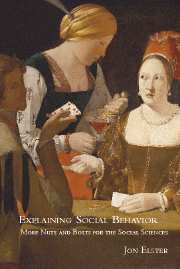Book contents
- Frontmatter
- Contents
- Preface
- Introduction
- I EXPLANATION AND MECHANISMS
- II THE MIND
- III ACTION
- IV LESSONS FROM THE NATURAL SCIENCES
- V Interaction
- 18 Unintended Consequences
- 19 Strategic Interaction
- 20 Games and Behavior
- 21 Trust
- 22 Social Norms
- 23 Collective Belief Formation
- 24 Collective Action
- 25 Collective Decision Making
- 26 Organizations and Institutions
- Conclusion: Is Social Science Possible?
- Index
20 - Games and Behavior
from V - Interaction
- Frontmatter
- Contents
- Preface
- Introduction
- I EXPLANATION AND MECHANISMS
- II THE MIND
- III ACTION
- IV LESSONS FROM THE NATURAL SCIENCES
- V Interaction
- 18 Unintended Consequences
- 19 Strategic Interaction
- 20 Games and Behavior
- 21 Trust
- 22 Social Norms
- 23 Collective Belief Formation
- 24 Collective Action
- 25 Collective Decision Making
- 26 Organizations and Institutions
- Conclusion: Is Social Science Possible?
- Index
Summary
Intentions and Consequences
The conceptual structure of game theory is illuminating. Does it also help us explain behavior? Consider the game-theoretic rationale for burning one's bridges or one's ships. This behavior could be undertaken for the strategic reasons set out in the last chapter, but also for others. The Oxford English Dictionary gives the following quotation from E. R. Burroughs, Tarzan of the Apes: “Because she had been afraid she might succumb to the pleas of this giant, she had burned her bridges behind her.” This is not a piece of strategic reasoning. Rather, the woman in question seems to fear that she might yield to entreaties if she did not make it impossible for herself to do so. Even in the military sphere, such nonstrategic rationales might be as important as the strategic ones. A commander might burn his bridges lest fear of the enemy make his soldiers take flight. He might want to prevent himself from deserting, if he is afraid that he might give in to weakness of will. Commander A might burn his bridges or ships to signal to enemy commander B that B cannot count on A's troops' running away. This was apparently the reasoning of Cortes when, telling his sailors (credibly but not truthfully) that his fleet was not seaworthy, he burned all his ships but one. (Also, by burning the ships he could add the sailors to his infantry.)
Information
- Type
- Chapter
- Information
- Explaining Social BehaviorMore Nuts and Bolts for the Social Sciences, pp. 331 - 343Publisher: Cambridge University PressPrint publication year: 2007
